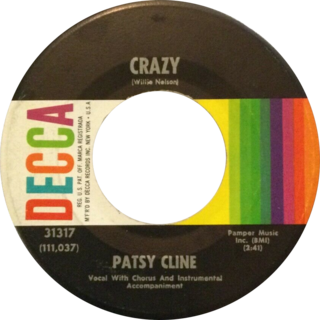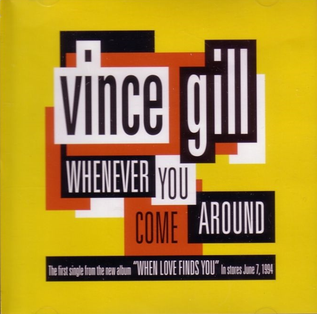Related Research Articles

"Crazy" is a song written by Willie Nelson and popularized by country singer Patsy Cline in 1961. Nelson wrote the song while living in Houston, working for Pappy Daily's label D Records. He was also a radio DJ and performed in clubs. Nelson then moved to Nashville, Tennessee, working as a writer for Pamper Music. Through Hank Cochran, the song reached Patsy Cline. After her original recording and release, Cline's version reached number two on Billboard's Hot Country Singles, also crossing to the pop chart as a top 10 single.
"Always on My Mind" is a ballad written by Wayne Carson, Johnny Christopher, and Mark James, first recorded by Brenda Lee and first released by Gwen McCrae in March 1972. Lee's version was released three months later in June 1972. The song has been a crossover hit, charting in both the country and western and pop categories. Elvis Presley's recording was the first commercially successful version of the song.

Stardust is the 22nd studio album by Willie Nelson, released in April 1978. Its ten songs consist entirely of pop standards that Nelson picked from among his favorites. Nelson asked Booker T. Jones, who was his neighbor in Malibu at the time, to arrange a version of "Moonlight in Vermont". Impressed with Jones's work, Nelson asked him to produce the entire album. Nelson's decision to record such well-known tracks was controversial among Columbia executives because he had distinguished himself in the outlaw country genre. Recording of the album took only ten days.
"Mammas Don't Let Your Babies Grow Up to Be Cowboys" is a country music song first recorded by Ed Bruce, written by him and his wife Patsy Bruce. His version of the song appears on his 1976 self-titled album for United Artists Records. In late 1975 and early 1976, Bruce's rendition of the song went to number 15 on the Hot Country Singles charts. This song was featured on Chris LeDoux's album released January 20, 1976, Songbook of the American West.

"Buy Me a Rose" is a song written by Jim Funk and Erik Hickenlooper, and recorded by American country music artist Kenny Rogers. It was released in October 1999 as the third single from his album She Rides Wild Horses and peaked at number one on the Billboard Hot Country Singles & Tracks charts in May 2000. The song made Rogers the oldest country singer to have a number one hit until Willie Nelson beat the record through a duet with Toby Keith on his 2003 single "Beer for My Horses". "Buy Me a Rose" was Rogers' first number one hit since 1987's "Make No Mistake, She's Mine" and his final charting top 40 hit on the US Billboard Hot 100 chart since 1984's "What About Me?".
"Drinking Champagne" is a song written by Bill Mack. He released the first version of the song on Pike Records in the mid-sixties. The song grabbed nationwide attention when the version by Cal Smith reached #35 on the country music charts in 1968.
"Don't You Ever Get Tired (Of Hurting Me)" is a country song written by Hank Cochran that was a hit single for Ray Price in 1965, reaching No. 11 on the Billboard chart. A later version by Ronnie Milsap in 1989 was Milsap's thirty-third number one single as a solo artist. The single went to number one for one week and spent a total of thirteen weeks on the chart. Other notable recordings of the song were done by Jack Greene and George Jones and by Price and Willie Nelson as a duet.
"Nothing I Can Do About It Now" is a song written by Beth Nielsen Chapman, and recorded by American country music artist Willie Nelson. It was released in April 1989 as the first single from the album A Horse Called Music. It was Nelson's fourteenth number one single on the U.S. Country Singles chart. The single spent one week at number one and a total of fifteen weeks on the chart.

"So Much Like My Dad" is a song first recorded by Willie Nelson on his 1986 album Partners. American country music artist George Strait released the song in June 1992 as the second single from his album Holding My Own. The song reached number 3 on the Billboard Hot Country Singles & Tracks chart in October 1992. The song was written by Chips Moman and Bobby Emmons.

"Whenever You Come Around" is a song co-written and recorded by American country music artist Vince Gill. It was released in April 1994 as the first single from the album When Love Finds You. The song reached number 2 on the Billboard Hot Country Singles & Tracks chart. It was written by Gill and Pete Wasner. The song was covered by Willie Nelson in 2014 for his Band of Brothers album.
"Last Thing I Needed First Thing This Morning" is a song written by Gary P. Nunn and Donna Farar, and recorded by American country music artist Willie Nelson. It was released in October 1982 as the third single from his album Always on My Mind. The song reached number two on the Billboard Hot Country Singles chart and number one on the RPM Country Tracks chart in Canada.
"There You Are" is a song written by Mike Reid and Kye Fleming, and recorded by American country music artist Willie Nelson. It was released in September 1989 as the second single from his album A Horse Called Music, and his last release in the 1980s. The song peaked at number 8 on the Billboard Hot Country Singles chart.
"Sweet Memories" is a song by Mickey Newbury, brought to success by Andy Williams. The song reached number 4 on the adult contemporary chart and number 75 on the Billboard chart in 1968.

"Do I Love You" is a song co-written and recorded by Paul Anka, from his 1972 eponymous LP. Released as an advance single in late 1971, "Do I Love You" reached number 14 on the Easy Listening Singles charts of both the U.S. and Canada, number 16 on the Canadian Pop chart, and was a modest hit on the U.S. Hot 100 as well. As with the earlier "My Way", it was adapted from a French-language song popularized by Claude François, and Anka composed the English lyrics.
"Bonaparte's Retreat" is the name of two related songs. The original was a wordless melody that existed as various fiddle tunes dating back to at least the late 1800s and probably well before that. In 1950, American country music artist Pee Wee King recorded a modified version of the song, with lyrics added, which he also called "Bonaparte's Retreat". This latter song has been covered by many country artists.

The following is a detailed discography of all singles released by American singer-songwriter Willie Nelson. A total of 25 Nelson singles have reached number one on music charts in the US.
"Ain't Necessarily So" is a song written by Beth Nielsen Chapman, and recorded by American country music artist Willie Nelson. It was released in September 1990 as the first single from his album Born for Trouble. The song reached number 17 on the Billboard Hot Country Singles & Tracks chart.

"Night Life" is a song written by country music singer-songwriter Willie Nelson. Nelson was inspired to write the song during one of his trips from his home in Pasadena, Texas, to his work, singing at the Esquire Ballroom in Houston.
"Three Days" is a song written by Willie Nelson. It was originally recorded by American country music artist Faron Young on his 1961 album The Young Approach. Young's version was released as a single in January 1962 and peaked at number 7 on the Billboard Hot Country Singles chart.

The following is a detailed discography of all singles released by American country music singer Waylon Jennings. A total of 16 Jennings' singles have reached number one on music charts.
References
- ↑ Willie Nelson Billboard Singles
- ↑ RPM Country Tracks
- ↑ "Willie Nelson Chart History (Hot Country Songs)". Billboard.
- ↑ "Hot Country Songs – Year-End 1983". Billboard. Retrieved June 17, 2021.